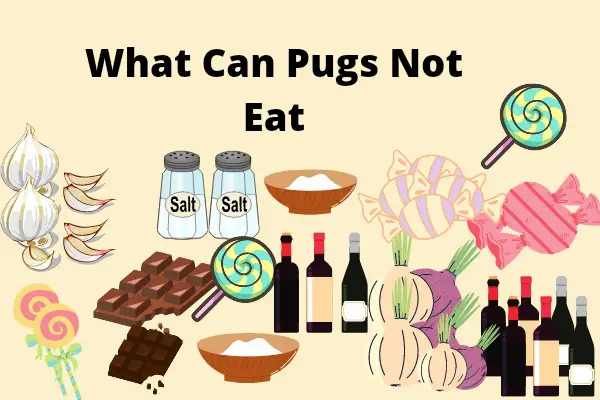What Can Pugs Not Eat (13 Worst Food To Avoid)

There are lots of human foods dogs can’t eat, so what can pugs not eat, let’s look at things pugs should not eat together.
We will be discussing the most common human food that you should never give to your pug for whatsoever reason.
Since pugs are smaller than large dogs, these meals may have greater effects on them.
We’ll go through some adverse effects of feeding certain foods to pugs.
If you want your pug to live healthy and longer, keep all the food listed here away from your pug. Here is the list of foods pugs can eat.
And if by mistake your pug eats them, please see your vet at once!
What Can Pugs Not Eat
A list of foods that are not good for pugs should be avoided is as follows:
1. Meals that are moldy or stale
Even so-called industrially prepared dry kibble can mold, making this the most harmful diet for your pugs.
Mycotoxins are produced by moldy food, particularly dry dog food, and they make pugs sick if they eat it.
Vomiting, hives, chronic diarrhea, decreased immune system, stomach bacteria, fever, and rashes are all possible adverse effects of feeding moldy or stale foods to pugs.
Keep an eye on your pug’s diet for mold, especially if you feed him kibbles and industrial treats.
Always per attention to the expiration date on the food pr treats you are giving your pug.
Don’t give stale food to pugs, always check to see the food you are pulling out from the fridge is still healthy.
2. Chocolate or chocolate products
Stomach rumbling, lethargy, seizure, irregular heartbeats, increased thirst, intestinal discomfort, restlessness, diarrhea, constipation, allergic skin responses, panting, and muscle tremors are all possible negative effects of providing chocolate to pugs.
Chocolate is one of the most harmful foods for pugs since it includes theobromine, a toxin that may cause a variety of health problems in pugs if consumed in excessive quantities.
Chocolate is toxic to pugs and should never be given to them.
Since pugs are such a little breed, the symptoms a dog may have as a result of eating chocolate are proportional to their weight.
Chocolate can induce allergic responses in the sinuses and skin, constipation, and migraine headaches with just a few bites.
3. Products with artificial flavors
Abnormal cholesterol levels, excessive blood sugar, diarrhea, bloating, hives, reduced immune system, metabolic syndromes, and rashes are all possible negative effects of providing artificial sweeteners to pugs.
Artificial sweeteners are substances that are used as food additives to give meals and beverages a syrupy sweet flavor.
They are calorie-free or low-calorie sweeteners because they contain significantly less nutritional energy than sugar-based sweeteners.
Artificial sweeteners should be avoided at all costs since most of them include xylitol, which is toxic to pugs and damaging to their health.
When pugs consume substantial amounts of artificial sweeteners, their blood sugar levels plummet.
4. Products containing caffeine
Fatigue, disorientation, irregular heart rhythm, sleeplessness, digestive difficulties, muscle breakdown, and chronic dehydration are all possible negative effects of providing caffeine products to pugs.
Caffeine is an alkaloid found in a variety of plants, including cocoa beans, kola nuts, tea leaves, yerba maté, guarana berries, yaupon holly, and coffee beans.
Caffeine is found in a variety of soft drinks, pharmaceuticals, and over-the-counter drugs such as analgesics, diet aids, and cold/flu cures.
Do your best to avoid caffeine products as they can greatly hurt your pug.
5. Products containing Nutmeg
Heart illness, diarrhea, bloating, hives, reduced immune system, metabolic syndromes, and rashes are all possible negative effects of providing caffeinated products to pugs.
The poison “myristicin” is found in nutmeg. It’s better to keep your pug away from nutmeg, but if he ate a tiny quantity, he wouldn’t be hurt, but he could get an upset stomach.
Keep your nutmeg storage and spices out of your pug’s reach, since he’ll only be able to eat enough nutmeg to make him ill if he raids your supply.
6. Salty products or foods
Kidney failure, chronic dehydration, vomiting, tremors, high body temperature, seizures, and depression are all possible negative effects of feeding salty foods to pugs.
Pugs should avoid salty meals and foods. This not only boosts their blood pressure but also puts them at risk of kidney failure. Pugs are not permitted to eat salty snacks.
They include a lot of artificial colors and other substances that might create an adverse reaction in your pug.
Excessive salt consumption in pugs can induce dehydration, which can lead to health problems, therefore no matter how cute your pug is, don’t offer him salty food.
7. Unripe tomatoes
Urinary difficulties, acid reflux, heartburn, throat irritation, vomiting, disorientation, respiratory issues, renal troubles, and diarrhea are all possible negative effects of providing unripe tomatoes to pugs.
Although simpler to digest for humans, the main organic acids in fresh unripe tomatoes are citric and malic acid, which may not agree with a pug’s stomach.
Giving your pug unripe raw tomatoes is not recommended, since the number of unripe tomatoes you feed your pug might be harmful.
Read more about giving tomatoes to pugs.
8. Wild mushrooms
Excessive stomach discomfort, convulsions, vomiting, diarrhea, and liver and kidney damage are all possible negative effects of administering poisonous and wild mushrooms to pugs, depending on which mushroom group they belong to.
Pugs that spend a lot of time outside without their owners are more likely to stumble across poisonous and wild mushrooms.
It’s critical that your pugs don’t consume them, as the consequences might be anything from moderate sickness to death.
9. Raw onions and garlic
Anemia, chronic lethargy, acute heartburn, high heart rate, allergic responses, and continuous vomiting are all possible negative effects of providing onion and garlic to pugs.
Garlic and onion, despite the fact that they are used in human medicine and are beneficial to humans, should not be offered to your pug.
In dogs, even a modest amount of this meal in its raw form can cause anemia and a lack of red blood cells.
No, pugs should never consume raw or cooked garlic or onions because they contain disulfides and sulfoxides, which are difficult for Pugs to digest and induce a burning feeling in the mouth or stomach.
Onions may be harmful to pugs in excessive amounts, so it’s better to avoid feeding them any at all.
It’s very likely that gastrointestinal irritation may develop, resulting in red blood cell destruction.
10. All alcoholic products
Collapsing, lethargy, constipation, extreme dehydration, irregular heart rhythm, muscle breakdown, frequent vomiting, and dizziness are all possible negative effects of providing alcoholic goods to pugs.
Since pugs are such little canines, even a sip from an unattended drink or a slice of rum cake mishandled might enter their system.
Pugs should never be fed alcohol or alcoholic products since it is unhealthy for them and can induce dehydration and vomiting.
As a result, giving your pug a substantial amount of alcohol is never a good idea.
11. Raw or undercooked eggs
Collapse, lethargy, bloated stomach, persistent diarrhea, reduced immune system, and stomach bacteria are all possible adverse effects of feeding pugs undercooked or uncooked eggs.
When providing an uncooked or raw egg to a pug, salmonella infection from a rotten egg is one of the most serious risks.
Eggs are abundant in protein, but they also serve as a breeding ground for bacteria.
Raw eggs may interfere with biotin absorption, resulting in skin and coat issues that make your pet uncomfortable.
Eggs must be cooked or fried before being given to your pet to reduce the risk of injury.
No, you should not offer raw eggs to your pug because they increase your chance of contracting salmonella, a hazardous bacteria that causes stomach pain, diarrhea, nausea, and fever.
Read more about safe ways of offering eggs to pugs.
12. All candy products
Increased blood sugar levels, weariness, liver difficulties, gastrointestinal pain, and pancreatitis upset are all possible negative effects of providing candy items to pugs.
All candies include the artificial sweetener xylitol, which, although not dangerous to humans, may cause pugs to produce more insulin.
High insulin levels induce excessive sugar absorption from the blood and hypoglycemia.
Low blood sugar levels result in weakness, incoordination, seizures, and, in the worst-case scenario, liver failure.
Xylitol is also included in a variety of toothpaste tubes, which you should keep out of the reach of your pug.
13. Avocado seed or leaf
Diarrhea, gastrointestinal discomfort, latex sensitivity, pancreatitis upset, cardiac damage, allergies, liver difficulties, vomiting, and itchy skin are all possible negative effects of providing avocados to pugs.
Avocado poisoning in pugs occurs when they swallow or eat a big amount of raw avocado.
If pugs eat the avocado pit, it contains a toxin called persin, which makes Pugs very sick.
Although the avocado is poisonous, the avocado leaf, which is a component of it, is the most deadly.
Avocados are poisonous due to the high quantity of persin in their leaves, seeds, bark, and fruit.
Avocados containing pits can cause gastrointestinal issues, and the amount of pits in various avocado cultivars varies.
With the information provided on this page, I strongly believe your question about What Can Pugs Not Eat was answered!






